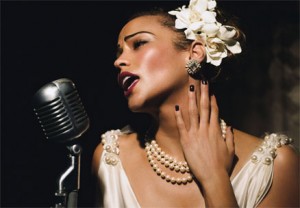
image via.
Jill Miller Zimon takes a look at About.com’s Top 100 Women in History list, and is understandably skeptical. How one even comes up with a “top 100 women” list is a mystery to me, and all the lists that I’ve seen are very Western-centric. But Jill makes some excellent additions, so I thought I’d turn it over to you all: Who’s on your heroine list? Who do you think made invaluable contributions to feminism, politics, the arts, literature, philosophy, sports, culture, social justice and the world in general?
In a similar vein, Glamour has a spread this month in which celebrity women dress up as American icons. It’s not as terrible as it could be (although it certainly is lacking, to be generous, in a lot of areas), but the repeated emphasis on beauty stuck in my craw (for Rosie the Riveter: “Strength is beautiful;” for Althea Gibson: “She showed women…you can be sweaty, be gorgeous and do a great job;” for Audrey Hepburn: “She was so simply beautiful. And she loved charity work, something even more beautiful about her”). Plus the fact that the only time they use the word “feminist” is in describing Carrie Bradshaw, who isn’t even a real person.
So who should our icons be? Surely we can create a better list than Glamour and About.com.